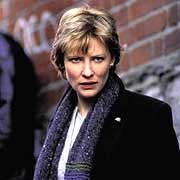|
Veronica Guerin covered organized crime
for Ireland’s best-selling newspaper, the Sunday
Independent. A household name, she was famous not only
for her fearless reporting about the murderers and
drug lords of Dublin’s criminal underworld but for her
commitment to defending the public’s right to know. As
a result of her work, she received numerous death
threats, was attacked numerous times and ultimately
killed.
Guerin was born in 1959 and came to journalism
relatively late. After studying as an accountant and
political researcher, she set up her own public
relations company before joining the Sunday Business
Post and what was then the Sunday Tribune. In 1994,
she joined the Sunday Independent and began her career
as an investigative reporter.
Guerin knew that her life was put at grave risk by her
prize-winning reports on leading underworld figures,
whom she identified by nicknames because of Ireland’s
libel laws. In October 1994, gunshots shattered the
windows of her cottage north of Dublin. On Jan. 30,
1995, the day after she published an article profiling
“The Monk,” a man suspected of masterminding the
largest robbery in Ireland’s history, Guerin was shot
in the thigh by an unidentified assailant who attacked
her in her home. Undaunted, she vowed to continue her
investigations upon her release from the hospital. “I
vow that the eyes of justice, the eyes of this
journalist will not be shut again,“ she said. “No hand
can deter me from my battle for the truth.” Her
employer, Independent Newspapers, installed an
expensive security system to protect her.
On Sept. 13, 1995, she was attacked again, this time
by a convicted criminal, John Gilligan, who viciously
beat her when she sought to interview him. According
to Guerin, Gilligan called her the next day and said,
“If you write a word about me, I will find your boy
and kidnap him and rape him. I am going to kill you if
you write a word about me.” Following this incident,
the police provided her with a 24-hour escort, but she
quickly dispensed with this protection because she
said it hampered her style.
Guerin was killed on June 26, 1996, when one of two
men on a motorcycle fired six rounds from a pistol at
close range as she waited in her car at a traffic
light just outside Dublin. She was 37 and married with
a 6-year-old son, Cathal. She was murdered two days
before she was due to address a conference in London
on “Dying to Tell a Story: Journalists at Risk.”
Guerin’s slaying, the first murder of a journalist in
the Irish Republic, sent shock waves throughout the
country. Prime Minister John Bruton called it “an
attack on democracy.” The Irish Parliament marked her
death with a moment of silence. In a joint statement,
leading editors in Ireland and Great Britain declared:
“Veronica Guerin was murdered for being a journalist.
She was a brave and brilliant reporter who was gunned
down for being tenacious. This assassination is a
fundamental attack on the free press. Journalists will
not be intimidated.”
Her death led to Ireland’s largest criminal
investigation, resulting in over 150 arrests and a
crackdown on organized-crime gangs that her assassins
could never have foreseen. In November 1998 Paul
“Hippo” Ward, a Dublin drug dealer, was convicted of
Guerin’s murder and sentenced to life in prison.
Although not the man who pulled the trigger, he had
disposed of both the pistol and the motorcycle used by
two accomplices in the shooting. Another man, Brian
Meehan, was accused of driving the motorcycle and
sentenced to life imprisonment in July 1999.
John “The Monk” Gilligan, suspected of leading the
gang, was also charged with murder. In October 1999,
he lost a three-year fight against extradition from
England, where he was being held on separate drug
charges, and was sent back to Ireland on Feb. 3, 2000,
to face proceedings in the Special Criminal Court.
Veronica Guerin devoted her career and life to
exposing the drug barons and leading figures in
Dublin’s underworld. “I am simply doing my job,” she
said. “I am letting the public know how this society
operates.” She paid the ultimate price for her pursuit
of truth.
|

